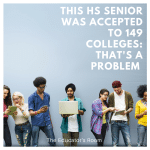Know your audience!
This is what marketers and educators have in common, especially as they both are focused on Generation Z (Gen Z) students, children born 1997-to the present. The one defining characteristic of Gen Z? These students (K-12) have never known a world without the internet or cell phones (mostly smartphones). For them, Google and Wi-Fi have always existed. They are wired, and their connection to a continuous flow of information means that traditional approaches to teaching information must change.
 Educators are in the business of developing skills in speaking, listening, reading, writing, and mathematics to Generation Z students, from pre-school to post high school. Educators are also traditional, often teaching the way they were taught. In targeting the needs of Gen Z students, they need to figure out which instructional strategies will be successful for this audience.
Educators are in the business of developing skills in speaking, listening, reading, writing, and mathematics to Generation Z students, from pre-school to post high school. Educators are also traditional, often teaching the way they were taught. In targeting the needs of Gen Z students, they need to figure out which instructional strategies will be successful for this audience.
Advertisers target Generation Z students with messages of empowerment to develop brand loyalty on behalf of clients, starting with the youngest consumers. They are continuously testing marketing strategies to see what works with children who are not as brand conscious as the Millenials before them.
As evidence, consider the TV commercials suggesting that children are capable of “making the choice” in the purchase of the family car:
- Honda Ad: A young daughter knows exactly what her parents want. After she lists off her requirements, the salesperson suggests to her the Honda CR-V.
- Hyundai: A salesman offers the Elantra and Sonata as great options, but dad has to check in with his daughter. She says “we’ll take both” with a smile.
The family car is not the only traditionally adult purchase receiving this attention:
- A little girl promotes an Internet subscription service by finishing all of the salesman’s sentences explaining pricing and savings. After he admits she’s good, she moonwalks away stating, “I’m just getting started,”
- A father distressed about a dent in his front bumper is comforted by his young daughter who says “Don’t worry, you have ___” and names an insurance company.
And the economic data shows that adults are listening to their Generation Z children. Barclays Bank reports,
“In the US, Gen Z currently have $200 billion in direct buying power but $1 trillion in indirect spending power by influencing household spending.”
Gen Z has a sense of “self”
Four years ago (2015), the children of Gen Z spent between six and nine hours a day absorbing media (survey Common Sense Media). Most of this time was spent on mobile devices so they could access social media or other digital experiences. A series of infographics offered by Vision Critical,a Customer intelligence (CI) firm, explain Gen Z as “the always on” generation who are not passive consumers. They help create and shape content because of their familiarity with technology.
Gen Z students are empowered, connected, empathetic self-starters that want to stand out and make a difference in the world.
The same conclusions were reached in a 2015 study offered in the Information Systems Education Journal (ISEDJ) titled Reaching and Retaining the Next Generation: Adapting to the Expectations of Gen Z in the Classroom. Gen Z has been raised with technology at an everyday level unlike that of any prior generation. They have a strong sense of “self” and are capable of being self-aware, self-learners, self-reliant and entrepreneurial (self-sufficient).
Empowered Students
Those school-aged children who watch orchestrated situations in TV car commercials where their peers negotiate as adults receive a message of empowerment. Children are in charge; children make the choice.
This form of empowerment has an impact on the classroom where past choices have been up to the teacher, particularly at the middle and secondary levels. For example, teachers may reach for novels which have worked with Generation X (students born 1966-1976) and Generation Y (students born 1977-1997). Teachers may justify their choice of a whole-class read by saying, “My students learn so much when we read _____ as a whole class” or “They need to read this kind of complex text to be ready for (state test, college).”
[bctt tweet=”But this is a new generation of students, and what has worked in the past may not work today.” username=””]
Teachers should review the conclusions of a 2017 report from IBM titled Uniquely Generation Z: What brands should know about today’s youngest consumers. The report notes that “Generation Z, the latest cohort of shoppers, wields enormous economic power and is key to consumer products and retail companies’ success.”
Among IBM’s recommendations to marketing agencies are six that apply to the classroom:
“Let Gen Zers shape their own experiences.
Don’t make them wait.
Foster a safe [online] environment built on trust.
Give Gen Zers control.
Value their opinions and let them help.
Don’t dictate to or imposed on them.”
Teaching Generation Z
In selecting instructional strategies, teachers may want to review the IBM recommendations for the Gen Z audience in their classroom. Students want to shape their own educational experiences. They do not want to wait to use their skills. They want to be trusted. They want control and their opinions valued. And, they do not want to be dictated to…or lectured at.
That means student choice in the materials or books they want to study, choice in the assignments they complete, and choice in peer collaboration.
Strategies that let Gen Z student determine their educational experiences are those that:
- provide opportunities for student inquiry;
- brainstorm what they want to know about a topic;
- use inquiry to teach research and presentation skills;
- use feedback quizzes or exit slips or polls to gather student opinions;
- allow for project choice;
- offer flexible seating;
- commit to choice in reading;
- allocate time to make connections to topics;
- require less teacher talk;
- create more hands-on centers, stations, or activities;
- include self-grading;
- build in self-reflection.
Discovering what works with Gen Z- the empowered self-aware entrepreneurs- will take some adjustment for both students and teachers alike. Figuring out the balance in providing what students want and what students need will take some experimenting…and there will be failures. Moreover, there is also an ominous tone in a 2018 analysis by the Pew Research Center that noted:
“Recent research has shown dramatic shifts in youth behaviors, attitudes and lifestyles – both positive and concerning – for those who came of age in this era.”
Positive? Gen Z students are self-reliant.
Concerning? Gen Z students are stressed. According to the American Psychology Association, 91% of Gen Z students feel stress.
Of course, the same could be said for their teachers.
Teaching Generation Z is going to cause stress.





I’m a little anxious about IBM’s “don’t make them wait.” Waiting is going to happen sometimes. Even when we get to the point where everything is ordered online, there’s going to be a wait to get them. It takes a bit for online sales reps to look up information. In the classroom, with 30, 40, even 75 kids in a classroom, there is going to be a wait. Impatience leads to unkindness. We need to teach kids to wait.